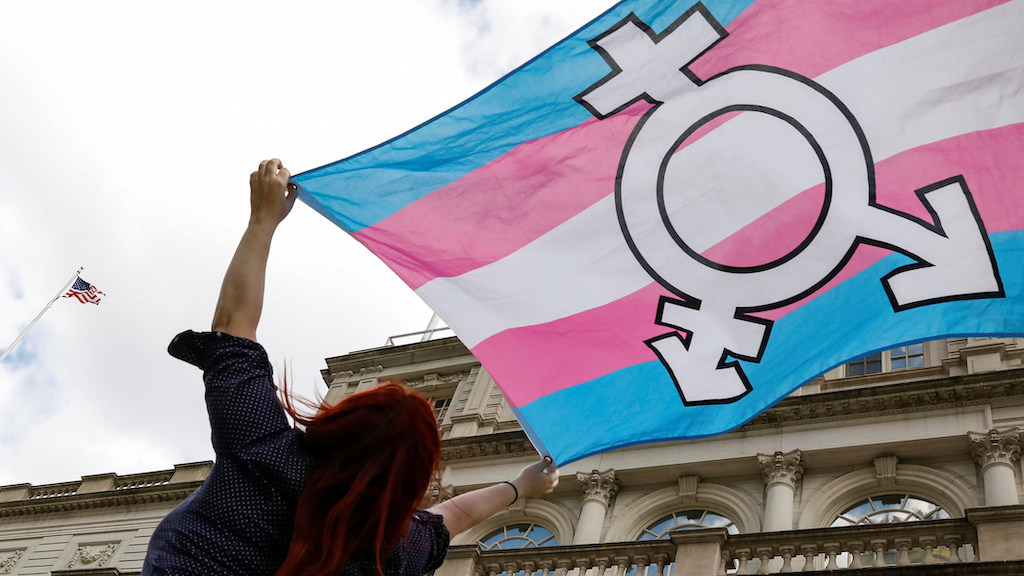Freedom of expression at risk: The war over transgender issues
In universities and social media in particular, activists of the LGBTQ movement (lesbians, gays, bisexuals, transsexuals, queers) are fighting doggedly for recognition and ever new rights. It is about whether trans women (who are biological men who usually also have male genitals, if not operated on) are left in toilets for women, their changing rooms, showers or prisons. Some older feminists are put off by this notion.
The fight is particularly fierce in Britain, with victims like Kathleen Stock, a professor of philosophy at the University of Sussex. After a year-long, increasingly violent campaign against her, which recently turned into downright psychological terror by masked activists, the 49-year-old has given up her professorship. One day there were “stock out” posters all over campus. She couldn't do it anymore, she was having a terrible time, said the lecturer. The activists then cheered on the Internet with the song line “Ding-dong. The hex is dead ”. In newspapers such as the "Mirror", the campaign was explicitly compared with the historical witch hunts.
A new witch hunt
Stock's offense that made her a “witch” consisted of her position that there is a biological gender above “self-identification” as “trans woman” or “trans man”. That is why the feminist, confessing lesbian philosopher speaks out against the fact that biologically male trans women are allowed in public women's changing rooms, showers or women's prisons. She doubts the phrase “trans women are women” - a tremendous provocation for modern trans-dogmatists. For this they attacked Stock for years. 600 academics signed an open letter of protest against Stock's "transphobia".
Even if the university stood behind them, the pressure eventually got too great. Afterwards, the university minister complained about "a toxic environment" at the university in Sussex. After Stock left there at the end of October, she has now found a new role at the new University of Austin in Texas.
The question of women's prisons is not a purely academic one. In the UK, self-proclaimed trans women convicted of a crime are being sent to women's detention centers. The case of Karen White, a man and convicted rapist who defines himself as a woman and abused and raped other women in a women's prison, shows that there are very real problems. Such cases have sensitized the “gender-critical feminists” like Stock or the criminologist Jo Phoenix. Phoenix was then attacked by trans activists with urine in her office.
Another preferred target is J. K. Rowling. The author, who lived very poorly at times, achieved an unprecedented global success with her Harry Potter novel series and earned an estimated billion US dollars with the books and their film adaptations. She is a moderate social democratic left herself, long-time Labor supporter, and founded and financed the Lumos aid organization to support children and families after she was shocked to see the fate of orphans in Moldova.
Rowling has also been in shitstorm by LGBTQ activists for about three years. Although she has expressed support for trans people: Everyone should lead their life in peace as they want. Rowling, however, has doubted whether it is right to let “trans women” in women's prisons and changing rooms, and she has expressed concern about the rapidly growing number of children and adolescents who are being declared transgender cases and who change their sex with hormone treatment - with the support of special clinics. Their number in England has risen by more than 2000 percent in ten years. Rowling is also uneasy about how more and more institutions, such as the British health service NHS, avoid the word "women" and instead use "people with a uterus" or "people who menstruate".
What triggered a downright shit hurricane against Rowling was her tweet in the summer of 2020, in which she was looking for the lost word “woman”: “People who menstruate? I am sure there was a word for these people. Help me: Womben? Wimpund? Woomud? ”Then all hell broke loose. On Twitter, Rowling was showered by tens of thousands of with savage abuse, hate messages, death threats and porn pictures. At a major transgender rights demonstration in London earlier this year, a cardboard poster in the blue, pink and white trans colors (ironically, heart-shaped) read, "Rot in Hell, Rowling". Where does this hatred come from? Where does this energy come from? Is it inferiority complexes that are compensated?
Resistance arises
In addition to the activists, there are organizations from the LGBTQ movement that systematically demand so-called trans rights. In England, the Stonewall organization, founded in 1989 as a homosexual association, stands out. In the meantime, it has completely relocated to trans-lobbyism and earns millions with "advice" to companies, state institutions and schools, who then acquire a "Diversity Champion" certificate if they create a gender-neutral environment, for example through "inclusive" toilets or rules for the correct pronouns (He / him, she / her, or they / them for transsexuals). The organization advises schools that teachers should no longer say “boys and girls” but rather “learners”. In three years, Stonewall has received more than £ 3 million in government funding.
For a few months now, however, Stonewall has been facing headwinds. The new Conservative Foreign Minister Liz Truss, previously Minister for Women and Equality, has ordered that her ministry no longer work with Stonewall. Other authorities are also withdrawing. Broadcasting giant BBC ended the Stonewall diversity program in mid-November. The association is now considered a "controversial lobby organization".
The Stock case, which was "canceled" by the activists at her university, also led to rethinking. The public is becoming increasingly aware of the disproportionate pressure that tiny but well-connected minorities are exerting.
Source: Preußische Allgemeine Zeitung
Photo: Reuters.







